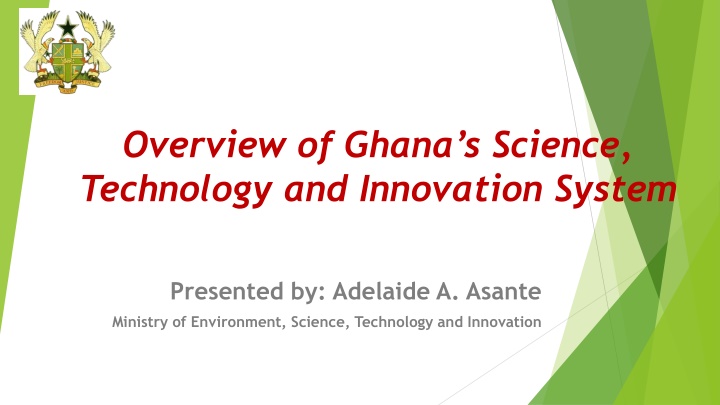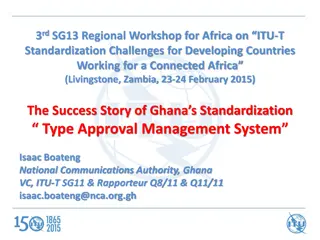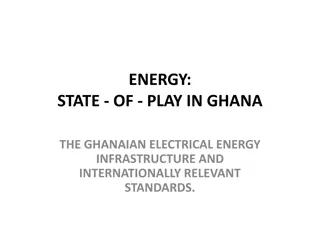Overview of Ghana's Science, Technology, and Innovation System
Ghana's Science, Technology, and Innovation (STI) system is led by the Ministry of Environment, Science, Technology, and Innovation, encompassing national policies, regulations, institutions, and human resources. The system includes key components such as national STI policies, research and development framework, funding mechanisms, and educational initiatives. Major stakeholders include public research bodies, universities, technical institutes, and private entities contributing to STEM-related fields. The country has established regulations and institutions to promote technological advancements and knowledge transfer in various sectors.
Uploaded on Oct 01, 2024 | 4 Views
Download Presentation

Please find below an Image/Link to download the presentation.
The content on the website is provided AS IS for your information and personal use only. It may not be sold, licensed, or shared on other websites without obtaining consent from the author.If you encounter any issues during the download, it is possible that the publisher has removed the file from their server.
You are allowed to download the files provided on this website for personal or commercial use, subject to the condition that they are used lawfully. All files are the property of their respective owners.
The content on the website is provided AS IS for your information and personal use only. It may not be sold, licensed, or shared on other websites without obtaining consent from the author.
E N D
Presentation Transcript
Overview of Ghanas Science, Technology and Innovation System Presented by: Adelaide A. Asante Ministry of Environment, Science, Technology and Innovation
Component of Ghanas R & D system National STIPolicies and Regulations National STI Institutions/ Infrastructure Funding for STI Components of Ghana s STI system National STI Human Resources National STI Programmes
National STI Policies and Regulations National STI Policy and 5 National STI Development Plan Technology Transfer Regulation, 1992 Council for Scientific and Industrial Research Act, 1996 Cocoa Research Institute Act Ghana Atomic Energy Commission Act, 2000 Intellectual property Act, 2003 Industrial Design Act, 2003, Copy Right Act, 2005 Others Universities act (eg. KNUST Acts, UG Act)
National STI Institutions/ Infrastructure Policy Body: Ministry of Environment, Science, Technology and Innovation- Responsible for National STI policies - Ministry of Education- Responsible for National STI education policies - Implementing Body: - 2 Major Public Research bodies- CSIR -13 Institutes and GAEC -6 Atomic and Nuclear Institutes - 1 Ghana Space Science and Technology Institute under GAEC - 1 Cocoa Research Institute of Ghana (CRIG) - 2 Medical Research Institutes- Noguchi Medical Research Institute and Center for Scientific Research in Plants Medicine (CSRPM), Mampong - GRATIS Foundation - Ghana Standards Authority - Food and Drugs Board - 10 Public Universities - 8 Technical Universities - 2 Polytechnics - Others- 38 Colleges of Education and 8 Technical Institutes - Approximately 6 out of the 60+ accredited private Universities are into some Science, Technology, Engineering and Mathematics (STEM) related areas -
National STI (R & D) Human Resources STI Teaching Staff 2013 Private 2014 Private 2015 Private Total Public Total Public Total Public Professors Doctoral (Phd) Master s (MSc/MA/Mphil) Sub - Total 170 892 1244 1 18 32 171 910 1276 153 832 1405 1 20 80 154 852 1485 149 989 1560 1 20 88 150 1009 1648 2306 51 2357 2390 101 2491 2698 109 2807
National STI programmes 2009-Date Total R&D personnel by sector of employment and occupation 2015. Government Higher Education Total No. % No. % No. % Researchers 870 62.0 4709 80.8 5579 77.2 Technicians 175 12.5 1052 18.1 1227 17.0 Other supporting Staff 358 25.5 66 1.1 424 5.8 Total 1403 100 5827 100 7230 100
Financing of STI in Ghana Government funding to STI constitutes 70% mainly from the consolidated funds STI funding is about 0.3% of GDP thus not meeting the AU Target of 1% STI Institutions receive grants and donations to support their activities which represents about 20% of their annual budgets Some STI Institutions also generates IGFs which represents about 10%-30% of their annual budget
Financing of STI in Ghana Sources of Funds for R&D 2013- 2015 Sources of funds 2013 (GHS) 2014 (GHS) 2015 (GHS) Public sector (IGF) 15,297,934 (16)* 20,377,589 (17) 12,791,444 (17) Public sector (Gov.) 52,811,052 (12) 73,591,585 (13) 89,508,213 (12) Private sector firms 31,166 (1) - - Private not-for profit organizations 30,844 (1) 27,272 (1) 27,810 (1) Foreign donor agencies 171,303,050 (5) 205,461,945 (5) 388,993,501 (5) Total 239,474,046 299,458,391 491,320,968
Challenges of Ghanas STI System Lack of Coordination of STI programmes and activities Inadequate implementation of STI policies and programmes Inadequate STI Infrastructure Inadequate STI human capacity ( R & D personnel, STI teachings staff esp at the basic schools) Duplication of STI activities amongst STI institutions Weak linkages between Research and Industry Fragmented STI activities Limited Budgetary allocation for STI No statutory fund for STI
Strategies for Developing Ghanas STI System National STI Baseline Survey Report Review of the National STI Policy Establishment of the National STI Advisory Apex Body Establishment of the National Research Advisory System and Programmes Establishment of the National Innovation/ Incubation Programme Establish National STI Fund
Conclusion Ghana has some of the institutional arrangements, policies, and programs to develop a dynamic and productive system of Science, Technology and Innovation The country s aspiration to become a developed country depends on what it does to improve its technological performance and the dynamism of its system of innovation. Need for strategic statutory STI Apex Management and Financing systems to be established.























